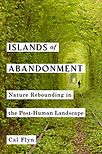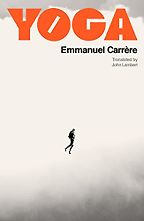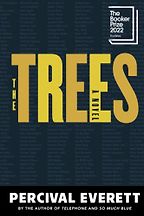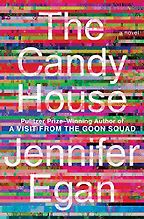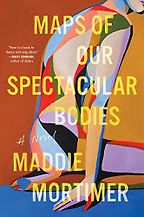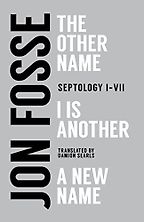It’s that time of year again—a time to reflect on the year that was. Compiling a list of novels I read over the course of 2022 is a way to remind myself of what I have consumed and enjoyed and learned from. I try to keep a varied literary diet, mixing old masterpieces with modern classics, nonfiction and buzzy new novels; here, I’ve confined my recommendations to only recent books—five 2022 novels that were true highlights of my reading year. There’s still time (just) to make them yours, too.
1. Yoga by Emmanuel Carrère
Early in the year, I fell hard for Emmanuel Carrère’s whirling, discombobulating work of autofiction, freshly translated into English by John Lambert. As I wrote back in spring, when my head was still spinning:
We, in the Anglophone world, have not paid Carrère his dues. This latest work is a difficult book to sum up, but suffice to say, it begins in an easy, breezy style that feels almost free-associative, before it swirls ever faster down the plug hole. Disparate, discordant elements come into alignment, and soon Yoga reveals itself to have been entirely orchestrated from beginning to end. By the closing pages I wanted to give it a standing ovation. You’ll either love it or hate it; clearly, I’m in the former camp.
This is a book that made me think: wow, I didn’t know we were allowed to do that. For all sorts of reasons—some moral—but many of them literary.
Carrère takes pains to underline his personal weaknesses (“I am an eminently moral individual who distinguishes very clearly between good and evil, and places nothing higher than goodness,” he explains, “but alas, no, I am not good.”) but does not hesitate to put them on display—nay, to parade them, in this book. Yoga charts his mental breakdown, after several self-congratulatory years of career success and marital bliss. His dramatic self-destruction spools out in slow motion—but there is something liberating in that for the reader, to see a writer dissect their own inner workings so painstakingly and under such a clear, bright light.
2. The Trees by Percival Everett
How to explain The Trees? It has so many disparate ingredients, which should not work together, but absolutely do. It is a gritty examination of the legacy of extreme racism and lynching in the Deep South. It’s a revenge thriller. It’s a buddy cop farce. It’s a detective novel with shades of the supernatural. And, well, it’s one of the best, most readable, funniest, and most hard-hitting novels I have ever read—never mind in 2022.
In a Guardian interview, Everett talked us through his rationale for this unusual approach:
It would be very easy to write a dark, dense novel about lynching that no one will read; there has to be an element of seduction. Humour is a fantastic tool because you can use it to get people to relax and then do anything you want to them. The absurdity of the inattention to the subject was the driving force of the comedy, but the novel lives as much in turning around stereotypes as it does in revealing the truth of lynching.
Everett’s previous novels (he has published 21) can be tricky to get a hold of here in the UK, so he was a new writer to me. But I’ve since learned that some of his back catalogue is available via Influx Press, and it was recently announced that Jeffrey Wright will star in a new film adaptation of his 2001 novel Erasure.
The Trees was shortlisted for the Booker Prize earlier this year and I had my money on it to win. Honestly, it’s so good. Do yourself a favour and read it.
3. The Candy House by Jennifer Egan
Egan’s joyously experimental A Visit From the Goon Squad (which found a rapturous reception on release in 2010, winning a Pulitzer Prize, a Los Angeles Times Book Prize, and a National Book Critics Circle Award) is one of my favourite books of all time. This new sequel offers an expansion of that roving, playful world, as bit-players from the earlier book take centre stage. As with Goon Squad, each chapter serves as its own standalone short story, with its own trademark style or literary device. The Candy House includes a version of her short story ‘Black Box’ (originally published via the New Yorker’s Twitter feed as a series of 140-character updates), and a funny epistolary chapter created from a very complicated email chain.
These episodes jet back and forth through time—some set in the recognisable past, some in a dystopian near-future—and together loosely form a grander narrative about an algorithm developed by an anthropologist, Miranda Kline (Goon Squad‘s Mindy, in her later years), which predicts social behaviour, and the invention of the ‘Collective Consciousness’, in which the memories of individuals have been uploaded into the cloud, building a hive-mind that might now be searched, analysed, and relived.
If, like me, you enjoy both speculative fiction and literary fiction, this will be right up your alley. It’s sharp, funny, and very, very clever—a social critique that never lapses into the portentous. You may also enjoy Emily St. John Mandel’s (author of Station Eleven) very good new time travel novel, Sea of Tranquility, which was also recently released.
4. Maps of Our Spectacular Bodies by Maddie Mortimer
In Maddie Mortimer’s intimidatingly mature and inventive debut novel, a British artist faces down terminal cancer as her daughter comes of age. It’s a moving, strange, and unexpectedly playful book, inspired by the death of Mortimer’s own mother when she was only fourteen, and is in part narrated by the anthropomorphised voice of cancer itself. That’s a bold artistic decision—one that sounds somewhat self-consciously clever-clever—but this sharp, darkly comic voice adds a great deal of humour and verve to an otherwise heartbreaking story.
Maps of Our Spectacular Bodies won the 2022 Desmond Elliot Prize (awarded annually to the best British or Irish debut novel), was shortlisted for the Goldsmiths Prize, and was longlisted for the Booker. Quite an achievement for a writer who is, if my sums are correct, only 26. So: expect great things from Maddie Mortimer. High-concept books like this aren’t for everyone, but if you like Ali Smith, Eimear McBride, and Max Porter, I think you’ll love Maps of Our Spectacular Bodies. The text itself, which has elements of concrete poetry, demands to be admired in hard copy. But it also translates unexpectedly well into a radio play; the audiobook is primarily voiced by Lydia Wilson, while Tamsin Grieg plays the role of Cancer, rudely interrupting with crows of victory and freewheeling observations. A whole-hearted recommendation.
5. Septology by Jon Fosse
Okay, I might be stretching it a little to describe Jon Fosse’s monumental stream-of-consciousness sequence Septology as a ‘2022 novel’ (the first two installments were released in 2019), but 2022 has certainly been the Year of Septology. A dual edition of Damion Searles’s masterful translations of books VI and VII (beautifully produced by Fitzcarraldo Editions) was shortlisted for the 2022 International Booker Prize, and this year it was collected in English for the first time by US publisher Transit Books, which released a handsome, seven-part hardback edition.
How to explain Septology? It is a contemplative narrative from the point of view of an ageing painter, living in rural Norway, who is greatly taken up with his relationship with another artist, an alcoholic with the same name and appearance—perhaps another version of himself, having made different life choices. When I spoke to the chair of the International Booker Prize judges, Frank Wynne, he described the reading experience as “luminous… like swimming in an open sea. You can’t see land in any direction.” I quite agree. It’s a challenging read, in much the same way that Lucy Ellman’s Ducks, Newburyport was challenging: it’s long, disorienting, and each section is comprised, essentially, of a single, infinitely unfurling sentence. But it’s a unique experience that rewards your time and attention. I loved what the critic Merve Emre had to say about it, which is what finally convinced me to give Septology a go myself: “the closest I have come to feeling the presence of God here on earth.” Surrender yourself into the void that is Septology.
Disclaimer
Of course—any ostensibly definitive list of ‘novels of the year’ is uncomfortably subjective. Not only are these choices a matter of taste, but it is also difficult to compare books read across such a long time period and in so many different contexts. The appreciation of any novel, I feel, is coloured by one’s state of mind while reading it. Some books I read with a pencil in hand, in order to review them; other books I flipped through while waiting for buses; others on a glowing screen in a darkened room beside my sleeping partner.
Get the weekly Five Books newsletter
I’ve been recommending Elizabeth Strout’s Oh William! to all those looking for a gentle domestic novel of unexpected profundity. Lillian Fishman’s Acts of Service and Julia May Jonas’s Vladimir to fans of Mary Gaitskill and Raven Leilani—that is, those who enjoy racy romantic encounters with a moral grey area. And Gabrielle Zevin’s Tomorrow, and Tomorrow, and Tomorrow will suit those looking for an easy read that nonetheless tackles interesting questions of creativity and the meaning of art.
These are all novels that intrigued, surprised, and amused me this year—but I’m only one person and I can’t read everything. I’m always interested to hear from you, our readers: What, in your opinion, were the best novels of 2022? Let us know.
Part of our best books of 2022 series.
Five Books aims to keep its book recommendations and interviews up to date. If you are the interviewee and would like to update your choice of books (or even just what you say about them) please email us at [email protected]
Five Books interviews are expensive to produce. If you've enjoyed this interview, please support us by donating a small amount.

